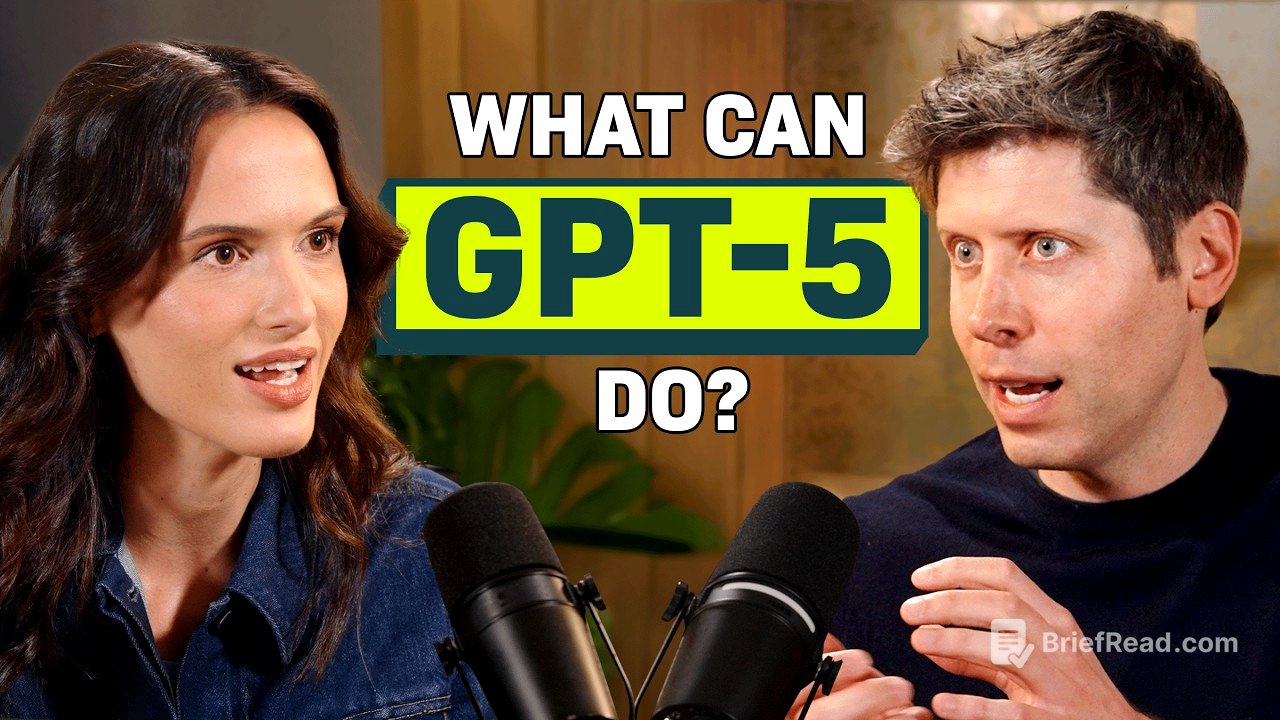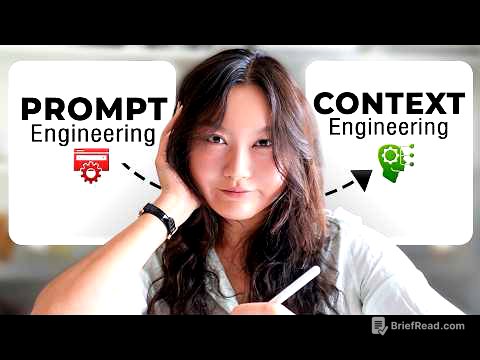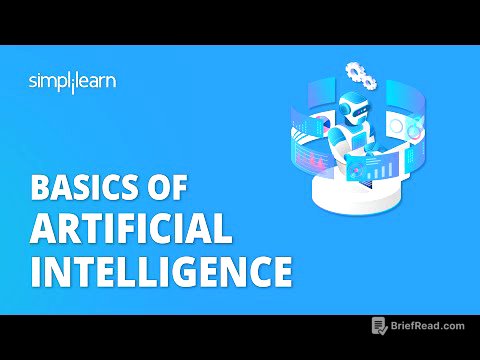TLDR;
Sam Altman, CEO of OpenAI, discusses the capabilities of GPT-5, its potential impact on society, and the future of AI. He addresses concerns about job displacement, the importance of adapting to rapid technological advancements, and the ethical considerations surrounding AI development. Altman emphasizes the need for shared responsibility in shaping the future of AI and encourages individuals to engage with the technology to understand its potential and limitations.
- GPT-5 excels in scientific and technical domains, enabling rapid software creation and problem-solving.
- AI is expected to make significant scientific discoveries within the next two years, driven by increased cognitive power and data analysis capabilities.
- The future requires a shift in the social contract to ensure equitable access to AI compute and resources.
What future are we headed for? [0:00]
The video introduces an interview with Sam Altman, the CEO of OpenAI, focusing on the future shaped by AI technology. It highlights the rapid advancements in AI, such as GPT-5, and their potential impact on various aspects of life, including intelligence, reality perception, and societal norms. The conversation aims to explore the possibilities and challenges that lie ahead as AI continues to evolve.
What can GPT-5 do that GPT-4 can’t? [2:06]
Altman explains that GPT-5 is significantly better at answering scientific and technical questions, providing accurate and comprehensive responses. He shares an anecdote about using GPT-5 to create a TI83-style game of Snake in seconds, highlighting its ability to generate software on demand. Altman notes that while GPT-5 is remarkable, it still has limitations and society will need to co-evolve with it to expect more from these tools.
What does AI do to how we think? [6:57]
Altman addresses the concern that AI tools might diminish cognitive skills by reducing "time under tension," which is the cognitive effort required for creative processes. He acknowledges that some individuals may use AI to avoid thinking, but others are using it to enhance their cognitive abilities. Altman expresses hope that AI tools will encourage more people to stretch their brains and increase their cognitive engagement.
When will AI make a significant scientific discovery? [10:52]
Altman predicts that a large language model will make a significant scientific discovery within the next two years, likely by late 2027. He attributes this to the increasing cognitive power of AI models, which have already demonstrated the ability to solve complex mathematical problems. Altman notes that while AI can analyze existing data, new scientific progress will also require building new instruments and conducting new experiments.
What is superintelligence? [13:09]
Altman defines superintelligence as an AI system that can perform research and make decisions better than the best human experts. He illustrates this by imagining an AI system that could outperform the entire OpenAI research team or run the company more effectively than he could. Altman acknowledges that this concept still sounds like science fiction but is becoming increasingly plausible.
How does one AI determine “truth”? [16:17]
Altman discusses how AI adapts to different cultural contexts and individual preferences. He highlights the enhanced memory feature in ChatGPT, which allows the AI to learn about users' backgrounds, values, and experiences. Altman envisions a future where AI models are personalized to behave in ways that align with individual and community preferences, while still using the same fundamental model.
It’s 2030. How do we know what’s real? [18:35]
Altman addresses the challenge of distinguishing between real and AI-generated content in the future. He suggests that the line between reality and simulation will continue to blur, as even photos and videos taken with current technology involve AI processing. Altman believes that society will gradually accept this convergence, and media will be understood as a mix of real and not real elements.
It’s 2035. What new jobs exist? [21:20]
Altman acknowledges concerns about job displacement due to AI but expresses optimism about the creation of new, exciting job opportunities. He suggests that by 2035, college graduates might be embarking on missions to explore the solar system or working in completely new, well-paid, and interesting jobs. Altman emphasizes that young people are the best at adapting to technological changes and that AI will enable individuals to create billion-dollar companies with amazing products and services.
How do you build superintelligence? [24:02]
Altman identifies four key factors in building superintelligence: compute, data, algorithmic design, and product development. He describes the massive infrastructure project required to build AI compute, including chip manufacturing, data center construction, and energy supply. Altman also discusses the importance of synthetic data and user feedback in training AI models to discover new things.
What are the infrastructure challenges for AI? [26:00]
Altman elaborates on the infrastructure challenges for AI, particularly the limitations imposed by energy availability. He notes that securing enough power to run gigawatt-scale data centers is a significant hurdle. Altman also mentions the need for advancements in processing chips, memory chips, and automated construction processes to build data centers more efficiently.
What data does AI use? [28:18]
Altman explains that while data remains important, AI models are increasingly learning things that don't exist in any data set yet. He highlights the excitement around synthetic data and the role of users in creating harder tasks for AI systems to solve. Altman emphasizes that AI models need to discover new things, similar to how humans come up with hypotheses and test them.
What changed between GPT1 v 2 v 3…? [29:50]
Altman recounts the evolution of GPT models, starting with GPT-1, which was initially mocked for its simple task of predicting the next word in a sequence. He explains that scaling up the models and using reinforcement learning led to significant improvements in reasoning and performance. Altman notes that these advancements were not obvious at the time and required overcoming skepticism from experts in the field.
What went right and wrong building GPT-5? [32:55]
Altman discusses the challenges and setbacks encountered during the development of GPT-5. He mentions a model called Orion, which was too large and unwieldy to use effectively. Altman explains that the team had to adjust their approach and focus on a new scaling law that provided better returns for compute on reasoning. He emphasizes that research involves many U-turns and that the overall progress has been remarkably smooth despite the day-to-day messiness.
“A kid born today will never be smarter than AI” [35:40]
Altman reflects on the implications of AI surpassing human intelligence. He suggests that children born today will grow up in a world where AI is always smarter than them and will be accustomed to a rapid pace of technological improvement. Altman advises parents to focus on teaching their children how to be good people and supporting their interests, as these values will remain important regardless of technological advancements.
It’s 2040. What does AI do for our health? [37:57]
Altman expresses optimism about the positive impact of AI on healthcare. He highlights the improvements in GPT-5's ability to provide accurate health advice and mentions instances where AI has helped diagnose rare diseases. Altman envisions a future where AI can cure or treat a significant number of diseases, making healthcare more effective and accessible.
Can AI help cure cancer? [40:00]
Altman describes a scenario where AI systems like GPT-8 could be used to cure cancer. He imagines AI analyzing vast amounts of data, designing experiments, and synthesizing molecules to develop effective treatments. Altman emphasizes that this capability would be invaluable to anyone who has lost a loved one to cancer.
Who gets hurt? [41:10]
Altman acknowledges that the rapid advancements in AI will likely cause disruption and displacement, similar to the industrial revolution. He notes that while society has proven resilient to technological changes, there will be classes of jobs that disappear and individuals who struggle to adapt. Altman calls for humility and openness to considering new solutions to mitigate the negative impacts of AI.
“The social contract may have to change” [43:00]
Altman speculates that the social contract may need to change to address the potential inequalities created by AI. He suggests that new ideas about how to distribute access to AI compute are needed to prevent conflicts over this valuable resource. Altman emphasizes the importance of making AI compute as abundant and cheap as possible to ensure that everyone can benefit from it.
What is our shared responsibility here? [45:22]
Altman emphasizes that the responsibility for shaping the future of AI is shared by everyone, not just the companies building it. He draws a parallel to the transistor revolution, where the impact on society was determined not only by the transistor companies but also by the companies that built on top of that technology and the decisions made by governments and individuals. Altman encourages people to build on AI and contribute to its development in positive ways.
“We haven’t put a sex bot avatar into ChatGPT yet” [49:21]
Altman discusses the trade-offs between winning the AI race and building an AI future that benefits the most people. He highlights OpenAI's commitment to aligning with users' long-term interests, even if it means sacrificing short-term growth or revenue. Altman mentions the decision not to include a sex bot avatar in ChatGPT as an example of prioritizing user alignment over potential gains.
What mistakes has Sam learned from? [51:40]
Altman reflects on a mistake OpenAI made with ChatGPT, where the model was being too flattering to users, which encouraged delusions in some individuals with fragile mental states. He notes that this was not the top risk they were worried about and that the incident highlighted the need to have a wider aperture to what they think about as their top risks. Altman emphasizes the importance of adapting to the co-evolution of society with AI services.
“What have we done”? [53:10]
Altman shares a moment of awe and concern he experienced when realizing the immense power of AI. He describes a conversation with a researcher about the potential for AI systems to emit more words per day than all people do and the implications of making personality changes to the model at that scale. Altman emphasizes the need to carefully consider the impact of AI on society and to develop procedures for testing and communicating changes.
How will I actually use GPT-5? [57:40]
Altman envisions a future where AI is more integrated into people's lives, proactively offering assistance and insights. He suggests that AI will connect to calendars, email, and other personal data to provide personalized recommendations and support. Altman imagines AI as a companion that is with you throughout your day.
Why do people building AI say it’ll destroy us? [59:40]
Altman expresses difficulty understanding why some people working on AI believe it will destroy humanity. He questions why they would continue to build the technology if they truly believed it would lead to such a catastrophic outcome. Altman acknowledges that there may be psychological factors at play and that some individuals may be motivated by a desire to mitigate the risks, even if they believe there is a small chance of disaster.
Why do this? [1:03:16]
Altman reflects on his personal motivation for working on AI. He shares that he has been an AI enthusiast his whole life and always believed it would be the most important thing ever. Altman expresses feeling lucky and privileged to be able to work on AI and to contribute to its development.









